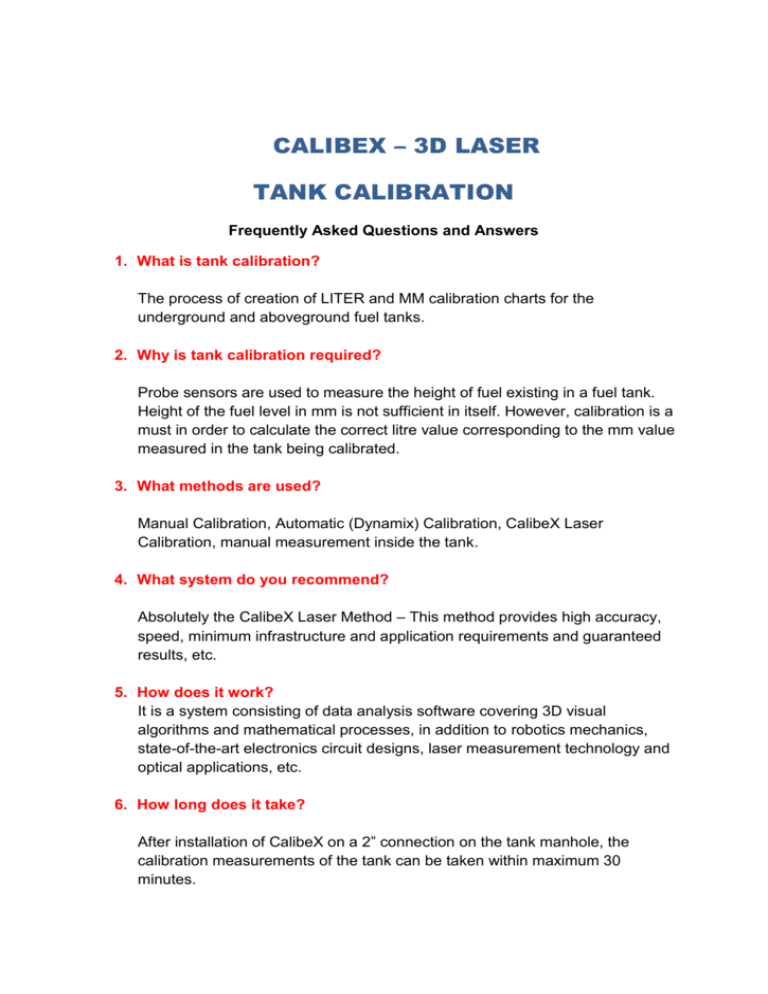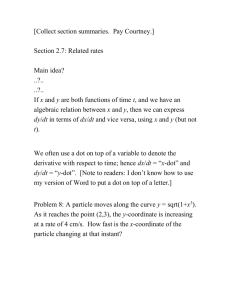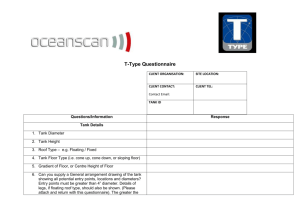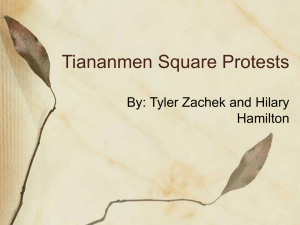CALIBEX * 3D LASER
advertisement

CALIBEX – 3D LASER TANK CALIBRATION Frequently Asked Questions and Answers 1. What is tank calibration? The process of creation of LITER and MM calibration charts for the underground and aboveground fuel tanks. 2. Why is tank calibration required? Probe sensors are used to measure the height of fuel existing in a fuel tank. Height of the fuel level in mm is not sufficient in itself. However, calibration is a must in order to calculate the correct litre value corresponding to the mm value measured in the tank being calibrated. 3. What methods are used? Manual Calibration, Automatic (Dynamix) Calibration, CalibeX Laser Calibration, manual measurement inside the tank. 4. What system do you recommend? Absolutely the CalibeX Laser Method – This method provides high accuracy, speed, minimum infrastructure and application requirements and guaranteed results, etc. 5. How does it work? It is a system consisting of data analysis software covering 3D visual algorithms and mathematical processes, in addition to robotics mechanics, state-of-the-art electronics circuit designs, laser measurement technology and optical applications, etc. 6. How long does it take? After installation of CalibeX on a 2” connection on the tank manhole, the calibration measurements of the tank can be taken within maximum 30 minutes. 7. How accurate and reliable are the results? What is accuracy rate? CalibeX has a accuracy rate between 0,2% and 0,9% in all experimental tests and site applications. They are uncertainty values that can be guaranteed. The calibration accuracy should be evaluated independently from problems such as pump automation, interruptions, transitions between tanks, siphon problems, filling detection problems, line leakages, pump calibration problems, application faults, etc. 8. Does the measurement performed have a guarantee? Accuracy of the results of the CalibeX measurements can be verified with the pump/tank sales data. CalibeX application is 100% guaranteed. If accurate results cannot be obtained, CalibeX is re-applied on free-of-charge basis if no correct results can be obtained. 9. How often does it need to be performed? As far as the location and inclination of the tank do not change, re-calibration is not needed. However, considering the factors affecting the tank, and as per the API 653 standards, calibration can be repeated every 5 years. 10. Does the calibration process involve excavation, etc. construction works? Under normal conditions, no construction or excavation works are required in or out of the tank. 11. Will I have to stop selling fuel during measurements? It is recommended that only the sales from the pumps connected to the tank being calibrated is required to be stopped. 12. How is reporting done? There is a GPRS SIM card inside the CalibeX. This SIM card transfers the measurement data to the 3D CalibeX server located in the ASIS Headquarters. Operators at the headquarters process all data for a specific tank within approximately 1 hour (under normal conditions, the operator creates the chart within 5 to 10 minutes), in the form of Graphical Chart. As a result of the analysis, the CalibeX charts are created. 13. What kind of a report do you provide? Calibration charts can be provided in PDF, Excel, CSV, Text files. 14. Can the system operate in conformity with different Tank Automation systems? The system can generate data conforming to all known tank automation systems. 15. Do you have compliance certificates? CalibeX has ATEX - IEF 11 ATEX O44X certificate. CalibeX was certified after conducting explosion tests, evidencing that it can operate safely even in cases when the tank contains fuel. 16. Aren’t the procedures conducted in the tank hazardous, how do you ensure safety? Employees are subjected to OCCUPATIONAL HEALTH, SAFETY AND ENVIRONMENT (OHSE) training programs regularly, and issued OHSE Certificates. CalibeX is operated by technical personnel who have such special training certificates. Training subjects: OHSE training for site personnel, fire training, PPE training, Emergency training, First Aid Applications, any other current OHSE-related subjects. 17. Is CalibeX a patented product? Patent application for the technology was made in 2007, and the patent of the same is held by ASIS all around the world since April 23, 2009. International Application Number: PCT/TR2007/000123 18. Do the measurements need to be taken by qualified personnel? Measurements can be easily taken by experienced technical personnel providing tank and pump services to service stations. Personnel working in specific periods should be retrained continuously. 19. What kind of technology do you use? The state-of-the-art laser measurement technology developed by ASIS is used. 20. Who are your competitors? 3D Laser Calibration system has been developed by ASIS for the first time in the world, and after introduction of CalibeX, an Italian company claims they also have Laser calibration system. 21. What are the fuel distribution companies with which you work? What are your References? Total of 11.300 tanks belonging to OMV POAS, BP, Lukoil, Aytemiz, and Alpet distribution companies have been calibrated to date. Total number equals to almost 12.000 tanks, including the public institutions and organizations, and corporate companies. Measurement results of these tanks are 100% within given tolerances. 22. What should the service stations do prior to commencement of the calibration with CalibeX? A 2” connection is required for installing the CalibeX, as well as 6” empty space around its own axis, and the tank to be calibrated should contain maximum 30% fuel. For higher accuracy and quality, the tank should be empty if possible. 23. What are your differences from other methods? On the service station side, it does not require extra costs for emptying and filling the fuel tanks, and consequently, minimizes the safety risks during these operations. CalibeX generate much more accurate and consistent results using the laser technology. Because the process takes very short period of time, it minimizes the downtime for the service stations. For example, calibration of a 20-ton tank lasts 2,3 months (average) with automatic calibration, around 8 hours (average) using manual calibration method, and around 30 minutes (average) with CalibeX.




